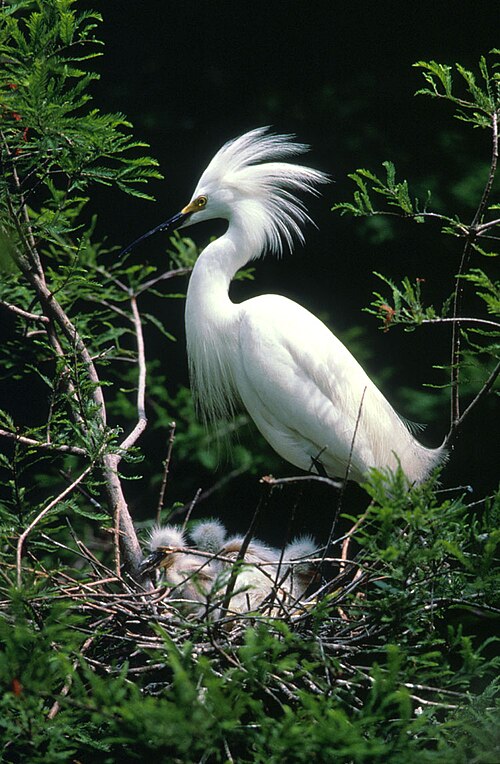Egretnoun
Any of various wading birds of the genera Egretta or Ardea that includes herons, many of which are white or buff, and several of which develop fine plumes during the breeding season.
Egretnoun
A plume or tuft of feathers worn as a part of a headdress, or anything imitating such an ornament; an aigrette.
Egretnoun
(botany) The flying feathery or hairy crown of seeds or achenes, such as the down of the thistle.
Egretnoun
(obsolete) The crab-eating macaque (Macaca fascicularis)
Egretnoun
The name of several species of herons which bear plumes on the back. They are generally white. Among the best known species are the American egret (Ardea egretta syn. Herodias egretta); the great egret (Ardea alba); the little egret (Ardea garzetta), of Europe; and the American snowy egret (Ardea candidissima).
Egretnoun
A plume or tuft of feathers worn as a part of a headdress, or anything imitating such an ornament; an aigrette.
Egretnoun
The flying feathery or hairy crown of seeds or achenes, as the down of the thistle.
Egretnoun
A kind of ape.
Egretnoun
any of various usually white herons having long plumes during breeding season
Egret
Egrets are herons that have white or buff plumage, developing fine plumes (usually milky white) during the breeding season. Egrets are not a biologically distinct group from herons and have the same build.
Cranenoun
Any bird of the family Gruidae, large birds with long legs and a long neck which is extended during flight.
Cranenoun
Ardea herodias, the great blue heron.
Cranenoun
A mechanical lifting machine or device, often used for lifting heavy loads for industrial or construction purposes.
Cranenoun
An iron arm with horizontal motion, attached to the side or back of a fireplace for supporting kettles etc. over the fire.
Cranenoun
A siphon, or bent pipe, for drawing liquors out of a cask.
Cranenoun
(nautical) A forked post or projecting bracket to support spars, etc.; generally used in pairs.
Craneverb
(ambitransitive) To extend (one's neck).
Craneverb
(transitive) To raise or lower with, or as if with, a crane.
Craneverb
(intransitive) To pull up before a jump.
Cranenoun
A wading bird of the genus Grus, and allied genera, of various species, having a long, straight bill, and long legs and neck.
Cranenoun
Any arm which swings about a vertical axis at one end, used for supporting a suspended weight.
Cranenoun
A machine for raising and lowering heavy weights, and, while holding them suspended, transporting them through a limited lateral distance. In one form it consists of a projecting arm or jib of timber or iron, a rotating post or base, and the necessary tackle, windlass, etc.; - so called from a fancied similarity between its arm and the neck of a crane See Illust. of Derrick.
Cranenoun
An iron arm with horizontal motion, attached to the side or back of a fireplace, for supporting kettles, etc., over a fire.
Cranenoun
A siphon, or bent pipe, for drawing liquors out of a cask.
Cranenoun
A forked post or projecting bracket to support spars, etc., - generally used in pairs. See Crotch, 2.
Cranenoun
The American blue heron (Ardea herodias).
Craneverb
To cause to rise; to raise or lift, as by a crane; - with up.
Craneverb
To stretch, as a crane stretches its neck; as, to crane the neck disdainfully.
Craneverb
to reach forward with head and neck, in order to see better; as, a hunter cranes forward before taking a leap.
Cranenoun
United States writer (1871-1900)
Cranenoun
United States poet (1899-1932)
Cranenoun
lifts and moves heavy objects; lifting tackle is suspended from a pivoted boom that rotates around a vertical axis
Cranenoun
large long-necked wading bird of marshes and plains in many parts of the world
Craneverb
stretch (the neck) so as to see better;








